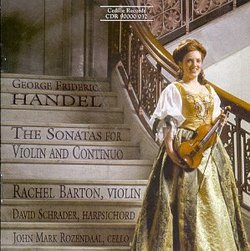| All Artists: George Frederick Handel, David Schrader Title: Handel: The Sonatas for Violin and Continuo Members Wishing: 0 Total Copies: 0 Label: Cedille Release Date: 11/1/1999 Album Type: Import Genre: Classical Styles: Chamber Music, Historical Periods, Baroque (c.1600-1750), Classical (c.1770-1830), Instruments, Strings Number of Discs: 1 SwapaCD Credits: 1 UPC: 789368546626 |
Search - George Frederick Handel, David Schrader :: Handel: The Sonatas for Violin and Continuo
 | George Frederick Handel, David Schrader Handel: The Sonatas for Violin and Continuo Genre: Classical
|
Larger Image |
CD Details |
CD ReviewsBaroque violin sonatas intelligently played klavierspiel | TX, USA | 04/05/2001 (4 out of 5 stars) "The history of Handel's sonatas for violin and continuo is a tangled web worthy of a detective novel. Suffice it to say that of the six included in the nineteenth-century complete edition of Chrysander, four were spurious, while other authentic works intended for violin by Handel remained largely unknown until modern times. The present recording by the young American violinist Rachel Barton includes all of the works for violin and continuo known to be authentic Handel, plus three of the four spurious sonatas included by Chrysander and published under Handel's name in separate editions for many years. Musical justification is given in the liner notes for _not_ including the fourth sonata, in E major, though one suspects that the real reason was lack of sufficient room on the CD.Musicological questions aside, this disc makes enjoyable listening. Perceptive listeners may be able to distinguish the authentic works from the doubtful by the former's greater harmonic variety, breadth of form and technical brilliance, but most music lovers won't care. At any rate, it hardly matters when all are played with equal ease and authority by Barton and company, performing on modern instruments at standard pitch. The general sound and musical tone is an intelligent compromise between so-called historically informed performance on authentic instruments, and mainstream practice. At times the profusion of added ornamentation gets in the way of rather than enhances the melodic line. In particular, cellist John Rozendaal's insistence on elevating the basso continuo to the same prominence and elaboration as the solo is occasionally irritating. On the whole, though, this recording is an expert, absorbing traversal of music that is too frequently relegated to "student repertoire" status." Lush, wonderful recording - more like desert than music C. Dyer | Washington, DC | 01/22/2003 (5 out of 5 stars) "This recording is pure indulgence. Barton reminds me of a few other young artists doing Baroque work these days (such as Ophelie Gaillard, the French cellist), who is capable of striking a very exciting balance between Baroque performance convention and a more personal, individual style. Barton plays with a confident, modern tone (standard pitch too), but uses ornaments and articulation typical of period performance. The balance between the instruments, criticized by another reviewer, is for me one of this recording's most pleasant features. The lush interplay of the instruments creates an experience that I can only compare to the feeling of eating some heavenly desert. First there is the rich, solid (but never heavy) base of cello, the sweet ambrosial filling of Barton's violin, and a crispy crust added by the harpsichord, giving texture and structure to the whole pie. Perhaps this analogy is a bit far-fetched for a review like this (in fairness though, this is the first time I've even thought of comparing a recording to food), but listening to the first few moments of the A major or D major sonatas alone manages to make traditional categories of description seem inadequate to me. I heartily recommend this recording."
|

 Track Listings (33) - Disc #1
Track Listings (33) - Disc #1